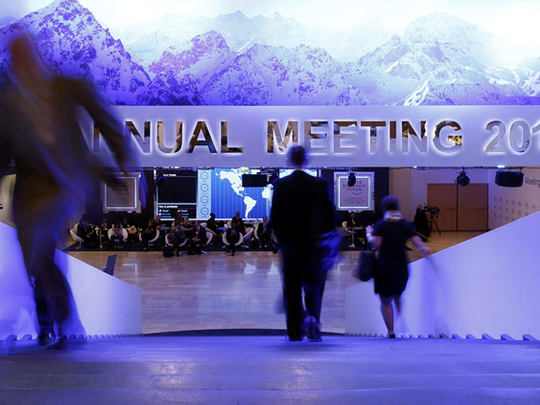
Davos
This year’s Annual Meeting in Davos comes when the global political organisations have largely failed in their responsibilities. It was stunning to hear Javier Solana, the former head of European Union foreign policy, be so scathing about the United Nations’ performance over this week’s important talks in Syria.
“The Geneva talks could not have been less professional,” he told me after speaking on a panel on global security. “The United Nations has no function and 2013 was the year we saw the end of multilateralism.”
He was referring the confusion over Ban Ki-moon’s on-off invitation to the government of Iran to the talks on Syria in Montreaux, which was all the more poignant as Iran’s President Hassan Rouhani arrived in Davos late on Tuesday to address the World Economic Forum on Wednesday. He caused a major stir when he joined the audience to listen to a speech by Japanese Prime Minister Shinzo Abe, not least because he stands out in his distinctive turban and robes, but also because he was accompanied by at least 25 aides and security men, making it hard to just mingle.
There is a background buzz in Davos this year as several leaders are attending who have deep quarrels. For example, Japan’s Abe took the time to listen to South Korea’s President Park Geun-hye when she made her appeal for a more creative and innovative economy and she called for “inclusive growth that cannot happen under existing macroeconomic policies or labour policies.”
Neither she nor Abe mentioned the islands that are hotly disputed between Korea and Japan but who knows what they said to each other when they met privately. There is no doubt her economic message of reform and innovation was very similar to what Abe spoke of later in the day when he outlined the successes and future hopes of the three arrows of Abenomics — a bold monetary policy, flexible fiscal policy, and encouraging private investment.
The confident and very articulate Abe gave a good talk. He started by admitting that it was perhaps too much to have a whole school of economics named after him, but he was too much of a politician to reject the word completely, so proceeded to use it freely with a mock modest grin as he outlined the radical reforms that he is pushing through the formerly moribund Japanese economy.
Unemployment
Outside the high level diplomacy of the world leaders, there are lots of other themes being explored at Davos, many of which share a common theme that major problems haves been identified and the solution may be in hand, but there is a grave risk that not enough will be done to make things right, or at the very least not make it worse.
This applies across a whole range of issues. The financial crisis is perhaps the most obvious, as the central bankers and politicians struggle with how to manage a global financial system with national governments doing the supervision. The failure of the world to prepare for climate change in any sort of adequate way is another gap in global governance. The forgotten Millennium Development Goals listed some essential achievements that countries around the world needed to enforce, which looked at the alleviation of poverty and the provision of good health and education, so that every individual’s full potential could be encouraged.
Speaker after speaker in different arenas have referred to the dangers of a “lost generation” as youth unemployment gets to frighteningly high levels. Spain is reporting unemployment of the under 25s at around 50 per cent, and similar numbers are coming up from a wide variety of developing countries, including the heavily populated countries of the Middle East like Egypt and Iraq.
A banker referred to statistics that show if someone does not get into the job market for five years, his or her lack of savings have a “catastrophic” effect on their future ability to ensure a secure old age.
Others have talked of the disenchantment that unemployment creates, and the growing danger of disenfranchisement. And this is all the more urgent because while thee people maybe unemployed and suffering, and feel disconnected from their society, they are still very much part of the digital age and are fully connected.
A social worker from New Jersey in the USA told a group how the city authorities are successfully communicating with their homeless population via Facebook. So even if they are homeless and jobless, these people are still connected and are far more able to find out what is happening in their society than their predecessors sheltering under the arches a few decades ago. And if this is happening in New Jersey, the same is happening in Baghdad and Cairo, where the danger of radicalisation is far greater.












